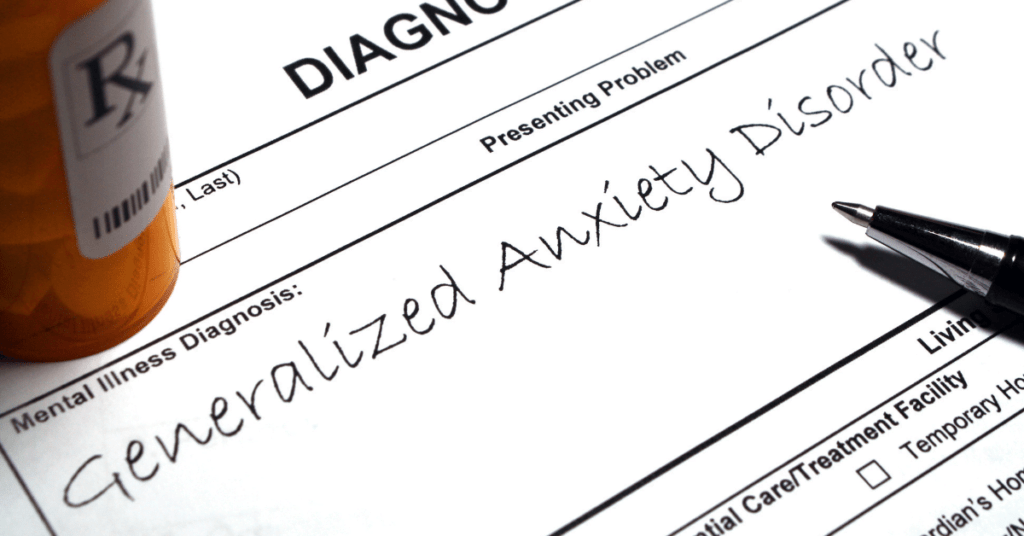Contents
- 1 What Is Generalized Anxiety Disorder?
- 2 Symptoms of Generalized Anxiety Disorder
- 3 Causes of Generalized Anxiety Disorder
- 4 Diagnosis Of Generalized Anxiety Disorder
- 5 Treatment Options With GAD
- 6 Who May Develop GAD?
- 7 Self-help Techniques To Overcome Generalized Anxiety Disorder
- 7.1 Watching Videos Of Other People Overcoming GAD
- 7.2 Connect With Others
- 7.3 Talk To People
- 7.4 Avoid People Who Make You Anxious
- 7.5 Find Things You Enjoy Doing
- 7.6 Exercise
- 7.7 Start A Journal
- 7.8 Ask Someone To Listen To You
- 7.9 Try Self-Hypnosis
- 7.10 Attend Support Groups
- 7.11 Focus On The Positive
- 7.12 Use Your Senses To Calm Down
- 7.13 Use The Breath
- 7.14 Mentally Prepare Yourself For Nightmares
- 8 Conclusion
What Is Generalized Anxiety Disorder?
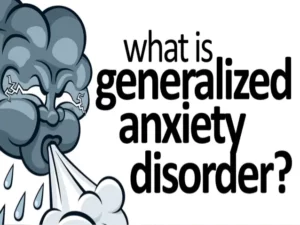 Generalized Anxiety Disorder, or GAD, is a disorder characterized by chronic and excessive anxiety. GAD is the most common anxiety disorder in the United States.
Generalized Anxiety Disorder, or GAD, is a disorder characterized by chronic and excessive anxiety. GAD is the most common anxiety disorder in the United States.
GAD is defined as a chronic disorder characterized by persistent, excessive anxiety and worry about everyday things. It causes severe mental, physical, and emotional symptoms that interfere with daily life. It usually starts during late adolescence or early adulthood but can arise in children or older adults.
Some health organizations say that GAD is a separate disorder from other types of anxiety disorders. But many health care providers believe it’s part of a larger illness that combines several different anxiety disorders.
Some people with GAD have a hard time controlling their worry and it can affect other aspects of their lives. They may find themselves worrying about lots of things at the same time, feeling restless or on edge, or even having trouble concentrating on anything but their worries.
It is crucial for people to understand what GAD is and how it can affect their lives negatively. This will allow them to seek help if they need it or at least know what they are up against. It’s important that people realize that there are treatments for this disorder that can help them live the life they deserve.
Symptoms of Generalized Anxiety Disorder

GAD is a serious mental illness that causes you to feel anxious and worried about the smallest things. It’s normal to be concerned about issues such as job, money, family, etc. But people with GAD become extremely anxious about those issues and develop other problems too. They may experience: It’s also common for people with GAD to experience physical symptoms. These include:
People with GAD often have trouble sleeping and suffer from irritability, restlessness, fatigue, muscle tension, or aches and pains. As a result of all these problems, people may have difficulty completing everyday tasks at work or school. They may withdraw from family and friends or be unable to perform normal activities.
Some of the main symptoms of GAD are:
- Muscle tension, uneasiness, and restlessness;
- Difficulty concentrating;
- Irritability;
- Fatigue;
- Trouble sleeping or sleeping too much;
- Headaches or stomachaches without a clear physical cause.
The emotional symptoms of GAD are irritability, persistent worry about multiple things at once, feeling overwhelmed with everything. The symptoms can get worse when there is no treatment for GAD.
Causes of Generalized Anxiety Disorder
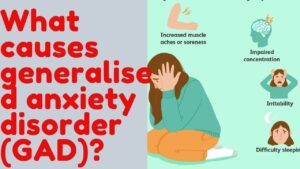
Generalized Anxiety Disorder (GAD) is one of the most common mental health issues in the world. It has affected millions of people all over the world, and it’s getting difficult to identify their symptoms and causes. The exact causes of GAD are unclear, but several factors have been linked to the disorder. One of these is genetics; GAD often occurs in people who have relatives with anxiety disorders. Other risk factors include chronic illness or pain, personality traits such as neuroticism or harm avoidance, and major life events including traumatic experiences.
While there are different causes that may lead to Generalized Anxiety Disorder, like genetics or brain chemistry, GAD often starts with family history. It can also be caused by stressful life events like work-related anxiety or unemployment; physical illness; and chronic pain.
Diagnosis Of Generalized Anxiety Disorder
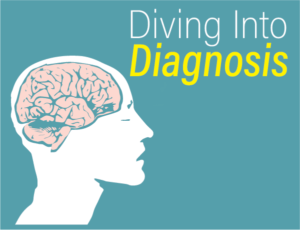 Generalized Anxiety Disorder (GAD) is a psychiatric disorder characterized by excessive worry about several events or activities.
Generalized Anxiety Disorder (GAD) is a psychiatric disorder characterized by excessive worry about several events or activities.
The Diagnostic and Statistical Manual of Mental Disorders (DSM-5) states that for this disorder to be diagnosed, the patient must experience worry about at least half of the days in the last 6 months, and it intensifies as they try to stop worrying.
Generalized Anxiety Disorder can be diagnosed by assessing six cognitive, behavioral, and physical symptoms. These include: worry about many different events or activities; muscle tension; fatigue; difficulty concentrating or thinking straight; irritability; sleep problems such as trouble falling asleep or staying asleep
GAD is diagnosed by a mental health professional after ruling out other conditions such as an overactive thyroid (hyperthyroidism), caffeine-induced sleep disorder, or posttraumatic stress disorder. There is no lab test that can be used to diagnose GAD; rather, it’s based on a doctor or mental health professional’s evaluation of anxiety and related symptoms. Individuals with GAD usually see a primary care doctor or mental health professional. It’s important to identify GAD early because it can interfere with daily activities and may lead to other disorders such as depression, substance abuse, or eating disorders.
Treatment Options With GAD
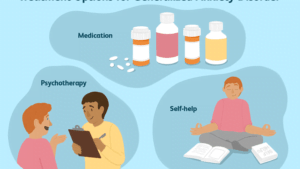
The article is on the treatment options for generalized anxiety disorder. It starts with a brief overview of how GAD can be more difficult to treat than other anxiety disorders. It then moves on to discuss the various treatment options for GAD, including medication, talk therapy, and psychotherapy.
Medications
There are two types of medication that are commonly used to treat GAD. They are anti-anxiety medications and antidepressants. With these medicines, it is important to make sure that they are taken at the right time in order to see maximum benefits. Talk therapy can also be helpful in treating GAD because it teaches individuals coping strategies that will help them through future stressful situations without feeling anxious or worried about what might happen if things don’t work out well. Psychotherapy is a form of talk therapy that helps people explore their thoughts, feelings, and behavior patterns in order to understand their problems and put an end to them.
Psychotherapy
 Treatment for GAD focuses on reducing anxiety and worry and teaching relaxation techniques. Your doctor may also recommend medications and psychotherapy.
Treatment for GAD focuses on reducing anxiety and worry and teaching relaxation techniques. Your doctor may also recommend medications and psychotherapy.
It’s usually best to start with relaxation techniques such as deep breathing, muscle relaxation, guided imagery, and yoga. Talk therapy is another option for treating GAD. It can involve working with a therapist or attending group counseling sessions.
Medications such as antidepressants or anti-anxiety drugs may also help reduce anxiety and improve sleep. But they can cause side effects such as nausea, irritability, or feeling tired.
As with any mental health disorder, it’s important to find a doctor you feel comfortable with and take steps to be healthy and happy. The benefits of psychotherapy are many, including increased self-esteem, improved relationships with others, more effective coping skills, better problem-solving abilities, reduced anxiety, and depression symptoms.
Who May Develop GAD?
Although GAD can develop at any age, it’s most common in young adults between the ages of 18-24. It affects twice as many women as men and is often associated with major life changes or stressful events. But people who have a history of anxiety disorders are more likely to develop GAD. Other risks factors include:
GAD is one of the most common mental health disorders; about 3.1% of adults in the United States are affected by GAD each year, and the lifetime prevalence rate is 5.7%. Of those affected with GAD, women are twice as likely to be diagnosed than men. GAD usually begins in early adulthood but it can also start in childhood.
Symptoms of GAD are chronic, usually lasting at least six months. They include excessive worry that is difficult to control and accompanied by compulsive behaviors or mental rituals in order to decrease anxiety. Individuals with GAD may also feel restless, irritable, easily fatigued, lightheaded, and have difficulty concentrating. Physical symptoms, such as headaches and muscle tension, are common.
Self-help Techniques To Overcome Generalized Anxiety Disorder
One of the main ways to help people with a generalized anxiety disorder is by providing them with self-help techniques. However, some people struggle with knowing which are the best self-help techniques for them. One way you can help people is to recommend they try different methods until they find one that works for them.
Self-help techniques are also something that many people want to know how to do without having someone else or a professional doing it with them. You might want to watch videos on YouTube of other people who have overcome generalized anxiety disorder and how they applied the self-help techniques.
Watching Videos Of Other People Overcoming GAD
Watching videos of other people overcoming generalized anxiety disorder can provide inspiration for people struggling with what’s going on in their life. Seeing someone else make a change can serve as motivation for them to make a change in their own life.
Connect With Others
 Connecting with others who have the same condition can help people learn how to better cope with their generalized anxiety disorder. Joining support groups are a great way to do this, but social media is also another option for people struggling.
Connecting with others who have the same condition can help people learn how to better cope with their generalized anxiety disorder. Joining support groups are a great way to do this, but social media is also another option for people struggling.
One of the most important things in overcoming any problems in your life is knowing you’re not alone and many others struggle with similar issues in life.
Social media can also help people get in touch with others who are trying to overcome their generalized anxiety disorder. They can share their stories of how they’ve dealt with or are dealing with certain situations that come up while trying to adapt new behaviors related to their GAD.
Talk To People
Talking to your loved ones about your generalized anxiety disorder can help you get a better understanding of what they’re going through when it comes to the changes you’re trying to make. In addition, talking about your thoughts and feelings can help others who have never experienced it or know someone who has to feel connected when it comes to the struggles that often come from being in a constant state of worry and fear.
Since it’s likely that most people don’t understand this condition, when you tell them about these self-help techniques, they’ll be able to support you throughout your journey. If you find you want to meet with a professional who helps others overcome GAD, such as a psychologist or counselor, they can also help you learn more about the different self-help techniques you can try.
Avoid People Who Make You Anxious
You can avoid people who make you anxious in different ways. One way is to distance yourself from them in social situations where they’re around or refuse to be around them when they’re in contact with one another. Another way is to talk to the person in question and ask them if there’s anything they can do differently so it won’t be so hard on you. For instance, a family member might feel uneasy around you because of your anxiety disorder, but it’s often not what they want.
Find Things You Enjoy Doing

You can find things that you enjoy doing as a self-help technique. For example, you could go for walks in nature or read books that allow you to explore new worlds and places. These activities can help distract you from your anxiety and give you a break from the constant worry that tends to come with this disorder.
Exercise
Exercising is one of the best things you can do for your physical and mental health as it allows both areas to improve over time. However, it’s important that people don’t exercise to the point where they feel physically exhausted because it could end up leading to more anxiety.
As with anything, you should start out slow and eventually work your way up to a regular routine of exercising for at least 30 minutes each day. One of the best things about this is that it can often help people sleep better at night which helps reduce signs of anxiety and stress.
Start A Journal
People who start a journal can get more out of their self-help techniques because they’re able to track how their emotions change from day today. In addition, writing down your thoughts on what’s going on can help you process your feelings and understand why you might be experiencing them in the first place.
Ask Someone To Listen To You
This is another good way to work through your anxiety. When you have someone who will listen to what you have to say, it can help you feel better in the moment and also when you’re all alone in bed at night because they give you a chance to get things off your chest. As long as you’re not feeling as though you need to talk about your anxiety 24/7, this is a good way to work through it.
Try Self-Hypnosis
 Self-hypnosis can be one of the most helpful techniques you can use if you want to learn more about yourself and how your brain works in relation to your fear and constant worry. While you might not necessarily learn anything new, it can be easier to deal with your constant worry when you know what’s going on in the first place.
Self-hypnosis can be one of the most helpful techniques you can use if you want to learn more about yourself and how your brain works in relation to your fear and constant worry. While you might not necessarily learn anything new, it can be easier to deal with your constant worry when you know what’s going on in the first place.
Attend Support Groups
Support groups are a great way for people who have GAD to talk about their struggles and get some feedback from other people who are dealing with the exact same thing. You might find that you learn a lot about yourself through these groups.
Focus On The Positive
There are many things in life to be grateful for, so you should use these moments as an opportunity to work on your anxiety. One of the best ways to do this is by focusing on the positive aspects of your life that you can be thankful for like family or friends who care about you.
Use Your Senses To Calm Down
The five senses can help you relieve anxiety in some ways.
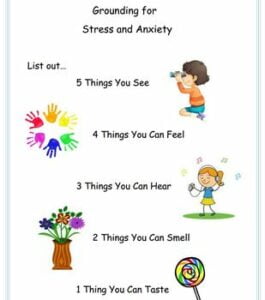
Sound therapy is one of the easiest ways to do this because it leads to your mind tuning out. You can use music or other sounds that help you relax in order to rid yourself of some anxiety.
Sight therapy is another great way to get rid of your anxiety. For example, you might close your eyes and listen to the sounds around you while focusing on how everything looks. This will help lead thoughts out of negative places so that they can’t bother you anymore.
Touch therapy is another thing people use their senses for is touch therapy. This is when they touch something soft in order to take their mind out of the stressful situation that they’re in.
Taste therapy is just another way people use their senses to relax. You can eat your favorite kind of food or drink a hot beverage if you want help taking your focus off of things that are stressing you out.
Smell therapy is similar to taste therapy because it’s another way to take your focus off of something. The only difference is that you will use a scent instead of a flavor in most cases.
Use The Breath
Some people find that it’s helpful to use the breath when they’re getting anxious because breathing is something everyone has control over. This technique might seem simple, but it can actually be extremely effective in helping you get rid of your anxiety.
Mentally Prepare Yourself For Nightmares

Nightmares are something that most people experience at least once in their life. And it’s no surprise that they’re often connected to stress and anxiety. If you know that you often deal with bad dreams. Then there are some things you can do to mentally prepare yourself for them.
For example, you can tell yourself after a bad day that there’s a possibility of having a nightmare when you hit the hay at night. By telling yourself this, your brain will begin to make it easier for you once you fall asleep.
Whatever self-help techniques you choose, remember to stick with something for at least 2 weeks before deciding it doesn’t work. The reason for this is that the change takes time and it’s important that you give yourself ample time to adjust.
Be patient with your self-help techniques because the results are often worth waiting for because they are good for both your mind and body. If you can stick with them for at least 2 weeks, you’ll find that your anxiety disorder is reduced. And often goes away completely after a few months of practicing these techniques regularly.
If you want to overcome your generalized anxiety disorder, consider trying out some of these self-help techniques and if they aren’t working for you. Try another one that might be more suitable for you.
Conclusion
Generalized Anxiety Disorder is a condition that can be difficult to deal with because it seems like there’s no end in sight. However, the good news is that if you want relief from your anxiety disorder. There are many self-help techniques available to help you through this process. The ones we’ve listed below should give anyone hope for overcoming their generalized anxiety disorder and living a life free of worry or fear. We encourage everyone who suffers from Generalized Anxiety Disorder to try out these techniques and see what works best for them.
For more information, please contact MantraCare. Anxiety is a common mental health condition characterized by persistent feelings of worry, fear, and apprehension. If you have any queries regarding Online Anxiety Counseling experienced therapists at MantraCare can help: Book a trial Anxiety therapy session
